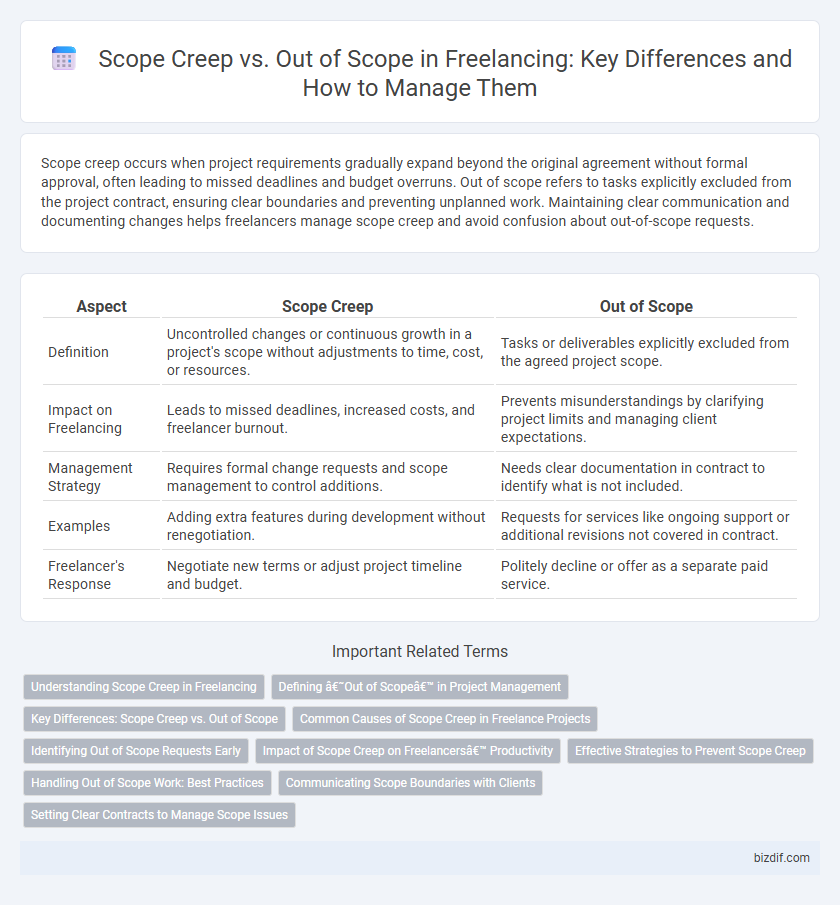Scope creep occurs when project requirements gradually expand beyond the original agreement without formal approval, often leading to missed deadlines and budget overruns. Out of scope refers to tasks explicitly excluded from the project contract, ensuring clear boundaries and preventing unplanned work. Maintaining clear communication and documenting changes helps freelancers manage scope creep and avoid confusion about out-of-scope requests.
Table of Comparison
| Aspect | Scope Creep | Out of Scope |
|---|---|---|
| Definition | Uncontrolled changes or continuous growth in a project's scope without adjustments to time, cost, or resources. | Tasks or deliverables explicitly excluded from the agreed project scope. |
| Impact on Freelancing | Leads to missed deadlines, increased costs, and freelancer burnout. | Prevents misunderstandings by clarifying project limits and managing client expectations. |
| Management Strategy | Requires formal change requests and scope management to control additions. | Needs clear documentation in contract to identify what is not included. |
| Examples | Adding extra features during development without renegotiation. | Requests for services like ongoing support or additional revisions not covered in contract. |
| Freelancer's Response | Negotiate new terms or adjust project timeline and budget. | Politely decline or offer as a separate paid service. |
Understanding Scope Creep in Freelancing
Scope creep in freelancing refers to the gradual expansion of project requirements beyond the originally agreed-upon deliverables without corresponding adjustments in time or budget, often leading to increased workload and client dissatisfaction. Understanding scope creep involves recognizing subtle shifts in client requests that are not formally documented in the contract, which can impact project timelines and resource allocation. Proactively managing scope creep through clear communication and contract amendments helps freelancers maintain project boundaries and ensure fair compensation.
Defining ‘Out of Scope’ in Project Management
Defining 'Out of Scope' in project management involves clearly identifying tasks and deliverables that are not included within the agreed project boundaries, ensuring that client expectations remain realistic and resources are allocated effectively. Out of scope items typically represent work that falls outside the initial project requirements, protecting both freelancer and client from unexpected workload and budget overruns. Precise scope definitions reduce conflicts by preventing scope creep, which occurs when additional tasks are added without formal approval or contract amendments.
Key Differences: Scope Creep vs. Out of Scope
Scope creep occurs when project requirements gradually expand without formal approval, causing delays and increased costs, whereas out of scope refers to tasks explicitly excluded from the project agreement. Effective freelancing requires clear documentation to prevent scope creep and avoid disputes over out-of-scope work. Understanding these distinctions helps freelancers maintain project boundaries and ensure fair compensation.
Common Causes of Scope Creep in Freelance Projects
Common causes of scope creep in freelance projects include unclear project requirements, frequent client requests for additional features, and lack of defined boundaries in the initial contract. Miscommunication between freelancers and clients often leads to evolving expectations that extend beyond the original agreement. Poor project management and insufficient documentation also contribute significantly to scope creep, increasing time and cost without corresponding compensation.
Identifying Out of Scope Requests Early
Identifying out of scope requests early in freelancing is crucial to managing project boundaries and avoiding unpaid workload. Clear communication and detailed project scopes prevent scope creep by setting explicit expectations with clients about deliverables and responsibilities. Tools like scope checklists and change order documentation support freelancers in maintaining control over project extents and protecting revenue streams.
Impact of Scope Creep on Freelancers’ Productivity
Scope creep significantly reduces freelancers' productivity by continuously expanding project requirements without additional compensation, leading to extended work hours and increased stress. This unpredictable growth in tasks disrupts time management and resource allocation, hindering the ability to meet deadlines and maintain quality. Unlike out of scope requests, which are typically identified and negotiated separately, scope creep erodes project boundaries and undermines the freelancer's workflow efficiency.
Effective Strategies to Prevent Scope Creep
Effective strategies to prevent scope creep in freelancing include clearly defining project deliverables and setting explicit boundaries for out-of-scope tasks in the contract. Regular communication and documented change requests help manage client expectations and maintain focus on agreed-upon objectives. Utilizing project management tools to track progress and scope changes ensures transparency and timely adjustments, reducing the risk of uncontrolled expansion.
Handling Out of Scope Work: Best Practices
Handling out of scope work effectively requires clear contract terms and proactive communication to manage client expectations. Establishing a documented change request process helps to assess additional time, costs, and resources, ensuring transparency and fair compensation. Leveraging project management tools for tracking scope boundaries reduces disputes and maintains project focus.
Communicating Scope Boundaries with Clients
Clearly defining scope boundaries with clients prevents scope creep and ensures project deliverables stay within agreed parameters. Effective communication about what tasks are included or excluded minimizes misunderstandings and protects budget and timelines. Using detailed contracts and regular check-ins reinforces mutual expectations and maintains project focus.
Setting Clear Contracts to Manage Scope Issues
Setting clear contracts that explicitly define project deliverables, deadlines, and responsibilities is essential in managing scope creep and out-of-scope requests. Detailed statements of work (SOW) and change management clauses help freelancers and clients maintain mutual understanding and prevent misunderstandings that lead to unauthorized work. Transparent communication and documented agreements reduce disputes and ensure projects stay on budget and schedule.
Scope creep vs Out of scope Infographic

 bizdif.com
bizdif.com